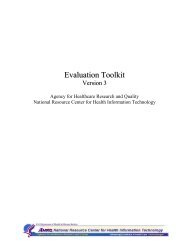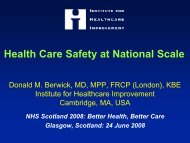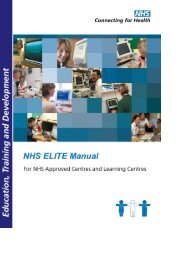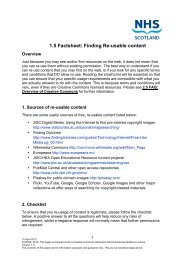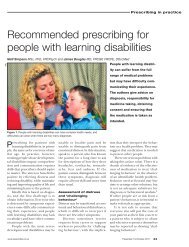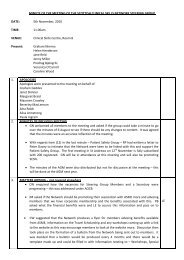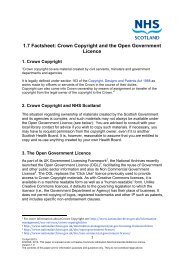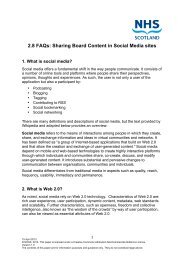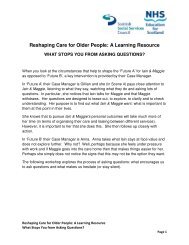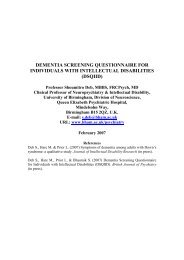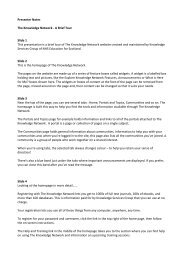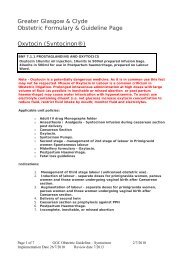The Fife Dementia Strategy: 2010 â 2020 - The Knowledge Network
The Fife Dementia Strategy: 2010 â 2020 - The Knowledge Network
The Fife Dementia Strategy: 2010 â 2020 - The Knowledge Network
You also want an ePaper? Increase the reach of your titles
YUMPU automatically turns print PDFs into web optimized ePapers that Google loves.
4.11.2 All people over the age of 65 receive a comprehensive geriatric<br />
assessment during admission to hospital.<br />
In 2008 in <strong>Fife</strong> 55% of acute medical admissions were patients over the age of<br />
65 years. An estimated 33% of these admissions had a significant cognitive<br />
impairment. A number of these patients may not have had an acute medical<br />
condition but were being admitted due to a lack of an alternative service to<br />
meet there needs. Despite this, it remains the case that in the acute<br />
environment the focus of assessment and care is on the patients’ physical<br />
condition, and their dementia or other mental health conditions are often<br />
overlooked 70 . When hospital staff fail to identify or deal with the whole person,<br />
including their dementia, it can lead to longer stays and poorer outcomes than<br />
for people who are psychiatrically well 71 .<br />
A recent review of the use of the admission assessments used in <strong>Fife</strong><br />
highlighted a lack of coordination in elderly patients admitted to acute<br />
medicine which resulted in problems further along the patient’s journey as<br />
their needs were insufficiently documented and addressed. Since recognising<br />
and assessing an individual with a potential cognitive impairment is the first<br />
step to providing person centred care in any environment, a more holistic<br />
approach better suited to the older person is necessary. In some cases it may<br />
be the first step towards receiving a diagnosis and getting the appropriate<br />
treatment and intervention.<br />
<strong>The</strong> comprehensive geriatric assessment assesses an elderly person’s<br />
physical, cognitive and mental health, as well as the functional ability and<br />
socio-environmental situation of the individual. <strong>The</strong> introduction of such a<br />
holistic assessment is thought to have a significant benefit to people with<br />
mental health conditions such as dementia in the hospital setting and is<br />
currently being piloted in <strong>Fife</strong>. <strong>The</strong> assessment framework will be evaluated,<br />
and if positive will be rolled out to all appropriate settings in <strong>Fife</strong>.<br />
Medical Admissions Unit Comprehensive Geriatric Assessment and Triage<br />
<strong>The</strong> Medical Admissions Unit in the Victoria Hospital Kirkcaldy is involved<br />
in a pilot project to develop the use of a comprehensive geriatric<br />
assessment and triage programme. All patients over 65 and admitted to<br />
the unit will receive an assessment within 24 hours of admission. <strong>The</strong><br />
main domains of the assessment surround physical health, functional<br />
ability, cognitive and mental health and factors that affect the persons<br />
socioeconomic situation. Using this tool will allow for a more reliable and<br />
efficient evaluation, and improved communication between health care<br />
providers. All of these aspects can positively impact the care of someone<br />
with dementia in the hospital.<br />
70 Borbasi S, Jones J, Lockwood C & Emden C. (2006). Health professionals’ perspectives of<br />
providing care to people with dementia in the acute setting: toward better practice. Geriatric<br />
Nursing. 27(5): 300-308.<br />
79




